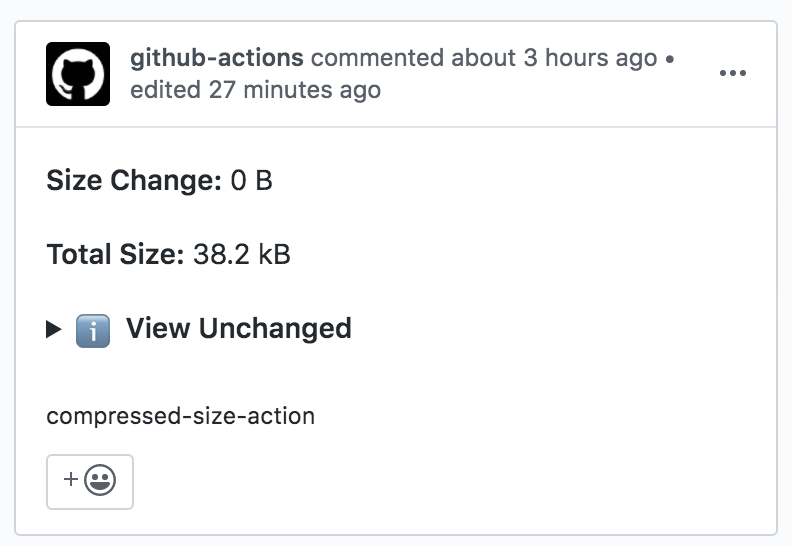A GitHub action that reports changes in compressed file sizes on your PRs.
- Automatically uses
yarnornpm ciwhen lockfiles are present - Builds your PR, then builds the target and compares between the two
- Doesn't upload anything or rely on centralized storage
- Supports custom build scripts and file patterns
Add a workflow (.github/workflows/main.yml):
name: Compressed Size
on: [pull_request]
jobs:
build:
runs-on: ubuntu-latest
steps:
- uses: actions/checkout@v2
- uses: insights-io/compressed-size-action@0.0.2
with:
repo-token: "${{ secrets.GITHUB_TOKEN }}"By default, compressed-size-action will try to build your PR by running the "build" npm script in your package.json.
If you need to perform some tasks after dependencies are installed but before building, you can use a "postinstall" npm script to do so. For example, in Lerna-based monorepo:
{
"scripts": {
"postinstall": "lerna bootstrap",
"build": "lerna run build"
}
}It is also possible to define a "prebuild" npm script, which runs after "postinstall" but before "build".
You can also specify a completely different npm script to run instead of the default ("build"). To do this, add a build-script option to your yml workflow:
name: Compressed Size
on: [pull_request]
jobs:
build:
runs-on: ubuntu-latest
steps:
- uses: actions/checkout@v2
- uses: insights-io/compressed-size-action@0.0.2
with:
repo-token: "${{ secrets.GITHUB_TOKEN }}"
+ build-script: "ci"compressed-size-action defaults to tracking the size of all JavaScript files within dist/ directories - anywhere in your repository, not just at the root. You can change the list of files to be tracked and reported using the pattern and exclude options, both of which are minimatch patterns:
name: Compressed Size
on: [pull_request]
jobs:
build:
runs-on: ubuntu-latest
steps:
- uses: actions/checkout@v2
- uses: insights-io/compressed-size-action@0.0.2
with:
repo-token: "${{ secrets.GITHUB_TOKEN }}"
+ pattern: "./build-output/**/*.{js,css,html,json}"
+ exclude: "{./build-output/manifest.json,**/*.map,**/node_modules/**}"Files are collected by finding matches for pattern, then any of those that match exclude are ignored. For that reason, most project don't need to modify exclude. The default values for pattern and exclude are as follows:
with:
# Any JS files anywhere within a dist directory:
pattern: "**/dist/**/*.js"
# Always ignore SourceMaps and node_modules:
exclude: "{**/*.map,**/node_modules/**}"A strip-hash option was added in v2 that allows passing a custom Regular Expression pattern that will be used to remove hashes from filenames. The un-hashed filenames are used both for size comparison and display purposes.
By default, the characters matched by the regex are removed from filenames.
In the example below, a filename foo.abcde.js will be converted to foo.js:
strip-hash: "\\b\\w{5}\\."This can be customized further using parens to create submatches, which mark where a hash occurs. When a submatch is detected, it will be replaced with asterisks. This is particularly useful when mix of hashed and unhashed filenames are present.
In the example below, a filename foo.abcde.chunk.js will be converted to foo.*****.chunk.js:
strip-hash: "\\.(\\w{5})\\.chunk\\.js$"By default, a file that's been changed by a single byte will be reported as changed. If you'd prefer to require a certain minimum threshold for a file to be changed, you can specify minimum-change-threshold in bytes:
minimum-change-threshold: 100In the above example, a file with a delta of less than 100 bytes will be reported as unchanged.

